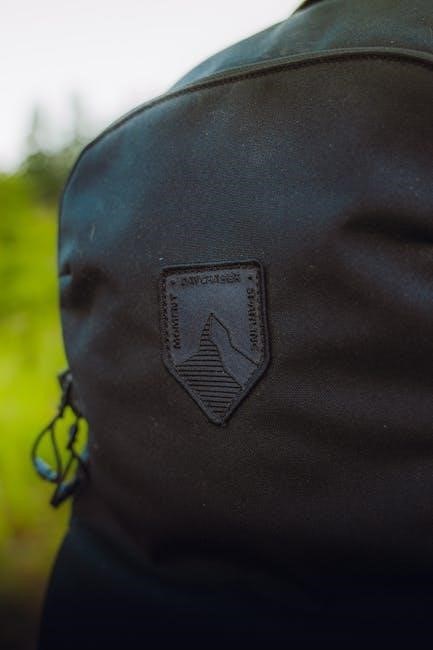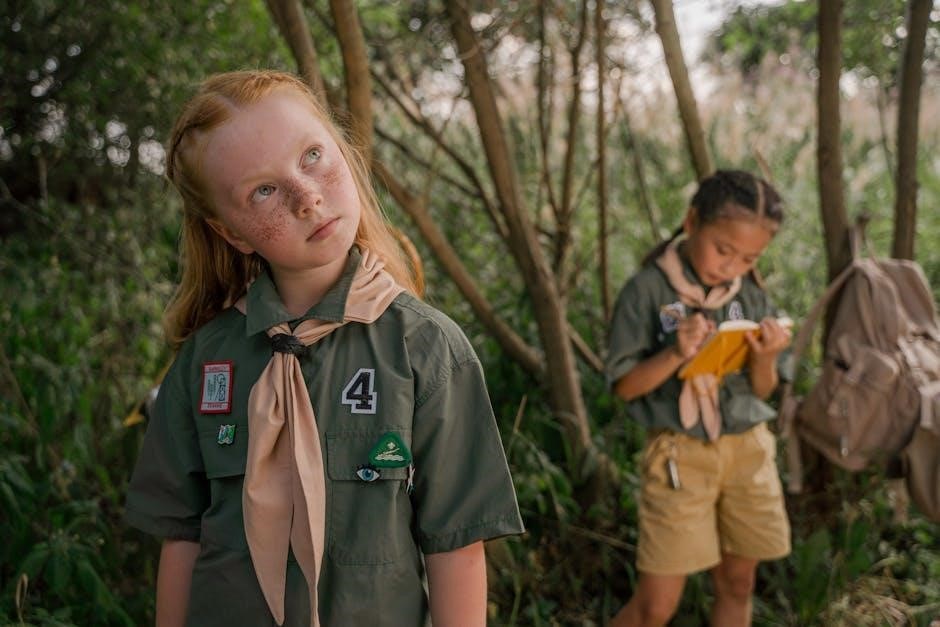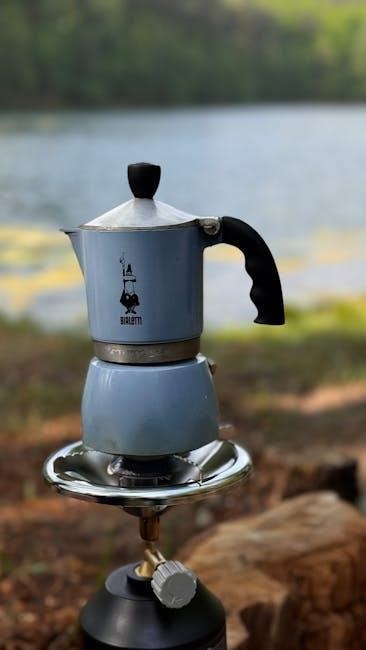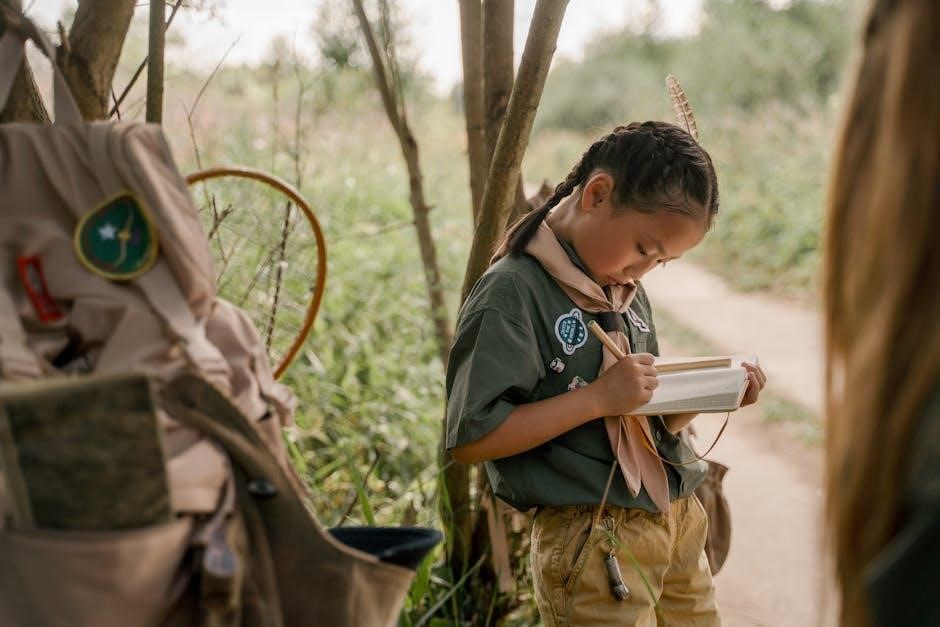camping merit badge requirements pdf

camping merit badge requirements pdf
The Camping Merit Badge is a cornerstone of Scouting, fostering outdoor skills, teamwork, and leadership. It requires Scouts to camp a total of 20 nights, with one long-term experience up to six nights. The merit badge emphasizes patrol organization, duty rosters, and environmental stewardship. Scouts must demonstrate proficiency in tent pitching, first aid, and emergency preparedness. The Camping Merit Badge workbook and pamphlet provide essential resources to guide Scouts through the requirements, ensuring a comprehensive understanding of camping principles and safety protocols.
1.1 Overview of the Camping Merit Badge
The Camping Merit Badge introduces Scouts to essential outdoor skills, emphasizing teamwork, leadership, and environmental stewardship. It requires Scouts to camp a total of 20 nights, with one long-term experience up to six nights. The badge focuses on patrol organization, duty rosters, and safety protocols. Scouts learn tent pitching, first aid, and emergency preparedness, using resources like the Camping Merit Badge workbook and pamphlet to guide their progress.
1.2 Importance of Camping in Scouting
Camping is a fundamental aspect of Scouting, fostering teamwork, leadership, and environmental stewardship. It builds confidence and self-reliance, teaching Scouts to navigate life’s challenges. Camping aligns with the Scout Oath and Law, promoting outdoor ethics and a connection with nature. It prepares Scouts to become responsible citizens, emphasizing the importance of preserving the environment and respecting natural resources for future generations.

Camping Merit Badge Requirements
Scouts must camp a total of 20 nights, including a long-term experience of up to six nights, sleeping under the sky or in a tent they pitch, demonstrating essential skills like tent pitching and first aid to meet the requirements for the camping merit badge.
2.1 Total Nights Camping Requirement
Scouts must camp a total of at least 20 nights at designated Scouting activities or events. These nights must include sleeping under the sky or in a tent they have pitched. This requirement helps build resilience, resourcefulness, and teamwork, ensuring Scouts gain extensive outdoor experience and mastery of camping skills.
2.2 Specific Camping Experiences Required
Scouts must complete specific camping experiences, such as hiking up a mountain with 1000 vertical feet gain or backpacking for at least 4 miles. These experiences are designed to test endurance, navigation skills, and adaptability in various outdoor conditions. They also foster a deeper connection with nature and enhance teamwork among patrol members.
2.3 Long-Term Camping Experience Option
The long-term camping experience allows Scouts to camp up to six consecutive nights, fostering endurance and teamwork. This option can be applied toward the total 20-night requirement; Scouts must sleep under the sky or in a tent they pitch, demonstrating their ability to thrive in extended outdoor settings and apply skills learned in shorter camps.
Planning and Preparation for Camping
Planning and preparation are essential for a successful campout. Create a duty roster to organize patrol responsibilities, ensuring smooth operations. Assign tasks like meal prep and gear checks for safety and efficiency.
3.1 Creating a Duty Roster for Patrol
A duty roster is essential for organizing patrol responsibilities during campouts. It ensures accountability and efficiency by listing tasks such as meal prep, water collection, and tent setup. Each member’s role is clearly defined, promoting teamwork and fair distribution of work. The patrol leader typically creates the roster, ensuring all duties are assigned and understood before the campout begins.
3.2 Assigning Responsibilities to Patrol Members
Assigning clear responsibilities to patrol members ensures accountability and smooth operation during campouts. The patrol leader delegates tasks like meal preparation, water collection, and tent setup based on individual strengths. Each member receives specific duties, fostering teamwork and accountability. Clear communication and understanding of roles are essential to ensure all responsibilities are fulfilled effectively, contributing to a successful camping experience.

Essential Camping Gear and Equipment
Essential camping gear includes a sturdy tent, sleeping bag, backpack, and appropriate clothing. Don’t forget a flashlight, water container, and proper food storage. Always choose gear suited to the weather and terrain conditions.
4.1 List of Necessary Gear for Camping
Essential camping gear includes a sturdy tent, sleeping bag, backpack, flashlight, water container, and extra clothing. Don’t forget a first aid kit, multi-tool, and camping stove. Proper footwear and rain gear are crucial. Always pack a map, compass, and sunscreen. Ensure all items are suitable for the terrain and weather conditions to guarantee a safe and enjoyable camping experience.
4.2 Importance of Tent Pitching Skills
Tent pitching is crucial for providing shelter and protection from the elements. Mastery of this skill ensures a comfortable and safe camping experience. Proper tent setup teaches Scouts resourcefulness and preparedness, essential for outdoor adventures. It is a key requirement for the Camping Merit Badge, demonstrating Scouts’ ability to handle outdoor challenges effectively and confidently.
Safety and Emergency Procedures
Safety and emergency procedures are vital for Scouts, emphasizing first aid and preparedness. Scouts must know how to respond to injuries and emergencies while camping. Proper training ensures they can act confidently and effectively in critical situations, safeguarding themselves and others.
5.1 First Aid and Emergency Preparedness
First aid and emergency preparedness are critical for Scouts. They must learn basic first aid, create an emergency plan, and know how to use a first aid kit. Scouts should be able to treat common injuries and respond to camping-related emergencies. Understanding how to prevent accidents and knowing when to seek professional help is essential. This knowledge ensures Scouts can act confidently in critical situations, protecting themselves and others while camping.
5.2 Understanding and Applying the Outdoor Code
Scouts must understand and apply the Outdoor Code, which emphasizes respect for nature and others. The code includes being clean in camp, keeping the outdoors clean, and being considerate in the outdoors. Scouts learn to minimize environmental impact and promote conservation. This principle aligns with the Scout Oath and Law, fostering responsible outdoor behavior and ethical decision-making during camping activities and beyond.

Outdoor Ethics and Environmental Impact
Scouts learn to minimize their environmental footprint by adhering to the Outdoor Code and Leave No Trace principles, promoting conservation and responsible outdoor behavior.
6.1 Principles of Leave No Trace
Leave No Trace principles guide Scouts to minimize environmental impact. Plan ahead, stay on trails, dispose of waste properly, and leave nature undisturbed. Avoid disturbing wildlife and keep campsites clean. These practices ensure sustainable outdoor experiences and promote conservation, aligning with the Camping Merit Badge’s focus on responsible camping and environmental stewardship.
6.2 Wilderness Use Policy
The Wilderness Use Policy applies to all privately or publicly owned backcountry land and designated wilderness areas. Scouts must adhere to the Outdoor Code and Leave No Trace principles in these areas. Proper supervision is always required during BSA camping activities to ensure safety and environmental protection, fostering responsible outdoor practices and conservation efforts. This policy ensures Scouts respect and preserve natural environments.
Leadership and Teamwork in Camping
Leadership is vital in camping, fostering teamwork and collaboration. Scouts learn to organize patrols, assign roles, and work together to achieve common goals, enhancing group dynamics and problem-solving skills.
7.1 Role of Leadership in Patrol Organization
Leadership is crucial in patrol organization, guiding members toward shared goals. A leader ensures tasks are assigned fairly, maintains morale, and fosters teamwork. Effective leadership promotes accountability, clear communication, and problem-solving, enhancing the patrol’s overall camping experience. By creating a duty roster and delegating responsibilities, leaders help the patrol function efficiently, fostering a sense of unity and purpose among all members, aligning with Scouting values.
7.2 Building Teamwork During Campouts
Teamwork is essential during campouts, as Scouts collaborate on tasks like setting up camp, cooking meals, and navigating trails. Shared responsibilities foster unity and mutual support, enhancing the camping experience. By working together, Scouts develop problem-solving skills, communication, and trust, strengthening their ability to rely on one another. These experiences align with Scouting values, promoting camaraderie and personal growth through collective effort and shared achievements.
Challenges and Obstacles in Camping
Challenges in camping include harsh weather, rugged terrain, and navigation difficulties. Scouts must overcome these obstacles to successfully complete the merit badge requirements and build resilience through teamwork and skill development.
8.1 Common Challenges Faced During Camping
Common challenges in camping include harsh weather conditions, rugged terrain, and navigation difficulties. Scouts may also face equipment failures, physical fatigue, and group dynamics issues. Additionally, managing wildlife encounters and maintaining hygiene in remote areas can be daunting. These challenges test problem-solving skills and adaptability, essential for meeting the merit badge requirements and fostering resilience.
8.2 Strategies to Overcome Camping Obstacles
To overcome camping challenges, Scouts should emphasize teamwork, proper planning, and adaptability. Creating a detailed duty roster ensures responsibilities are shared and tasks are managed efficiently. Practicing first aid and emergency preparedness helps address injuries and unexpected situations. Staying informed about weather conditions and having contingency plans can mitigate risks. Building stamina through practice hikes and fostering a positive mindset also enhances resilience and problem-solving skills.

Resources for Earning the Merit Badge
The Camping Merit Badge Workbook and pamphlet are essential tools, providing detailed requirements and guidance. These resources help Scouts organize their progress and understand camping principles effectively.
9.1 Camping Merit Badge Workbook
The Camping Merit Badge Workbook is a valuable tool designed to help Scouts track their progress and organize their thoughts. It provides structured worksheets for each requirement, ensuring Scouts can document their experiences, from camping nights to leadership roles. While it aids preparation, Scouts must still demonstrate skills and knowledge directly to their merit badge counselor, as the workbook alone does not suffice for completion.
9.2 Importance of the Merit Badge Pamphlet
The Camping Merit Badge Pamphlet is an essential resource, providing detailed explanations of requirements, camping skills, and safety guidelines. It serves as the official guide for Scouts, offering insights into outdoor ethics, leadership, and environmental stewardship. While workbooks help organize progress, the pamphlet ensures Scouts fully understand the principles and expectations of the Camping Merit Badge, aiding in comprehensive preparation and adherence to BSA standards.

Advancement and Benefits
Earning the Camping Merit Badge significantly contributes to Scouting advancement by developing essential outdoor skills and fostering leadership; Scouts gain lifelong abilities in teamwork, problem-solving, and environmental stewardship, enriching their Scouting journey and personal growth.
10.1 How Camping Merit Badge Contributes to Scouting Advancement
The Camping Merit Badge enhances Scouting advancement by teaching Scouts critical outdoor skills, fostering teamwork, and promoting leadership through hands-on experiences. Completing the required 20 nights of camping, duty rosters, and leadership roles builds confidence and responsibility, preparing Scouts for higher ranks and a lifelong appreciation of nature.
10.2 Lifelong Skills Gained Through Camping
Camping fosters lifelong skills such as problem-solving, adaptability, and teamwork. Scouts develop leadership, responsibility, and self-reliance while learning to navigate nature and work collaboratively. These experiences build confidence, resilience, and a deep appreciation for the outdoors, equipping Scouts with valuable life skills that extend beyond Scouting into personal and professional growth.

Reflection and Review
Reflection helps Scouts evaluate their camping experiences, identify personal growth, and refine skills. This process fosters a deeper understanding of achievements and areas for improvement.
11.1 Reflecting on Camping Experiences
Reflecting on camping experiences helps Scouts evaluate their skills, challenges, and personal growth. Documenting these reflections in workbooks or journals allows Scouts to track progress and identify areas for improvement. This process encourages Scouts to think critically about their experiences, fostering a deeper appreciation for the outdoors and their role within it.
11.2 Evaluating Personal Growth Through Camping
Evaluating personal growth through camping involves assessing how experiences have enhanced skills, confidence, and character. Scouts can reflect on challenges overcome, leadership roles, and teamwork demonstrated. Camping fosters resilience, problem-solving, and self-reliance. By fulfilling merit badge requirements, Scouts develop a sense of accomplishment and pride in their abilities, preparing them for future challenges and adventures;
Earning the Camping Merit Badge equips Scouts with essential outdoor skills, fostering personal growth, confidence, and a lifelong appreciation for nature and adventure, preparing them for future challenges.
12.1 Final Thoughts on Earning the Camping Merit Badge
Earning the Camping Merit Badge is a rewarding experience that fosters personal growth, teamwork, and a deep connection with nature. Scouts gain essential outdoor skills, confidence, and leadership abilities. The merit badge requirements, supported by workbooks and pamphlets, ensure a comprehensive understanding of camping principles. Completing the badge is a testament to dedication and prepares Scouts for lifelong outdoor adventures and challenges.
12.2 Encouragement for Future Camping Adventures
Camping is a lifelong journey of discovery and growth. Scouts who earn the Camping Merit Badge are encouraged to continue exploring the outdoors, seeking new challenges, and sharing their knowledge with others. Each campout is an opportunity to strengthen skills, build friendships, and connect with nature. Keep venturing forward, embracing the spirit of adventure that Scouting embodies, and inspiring others to do the same.